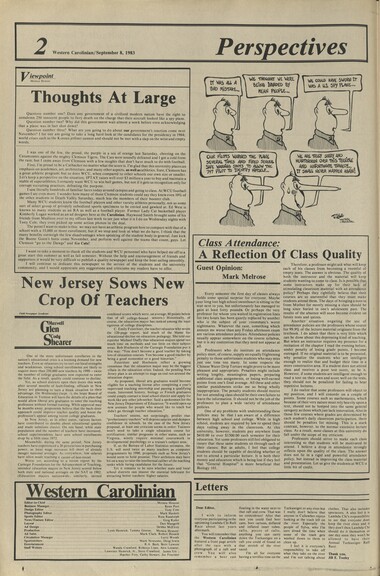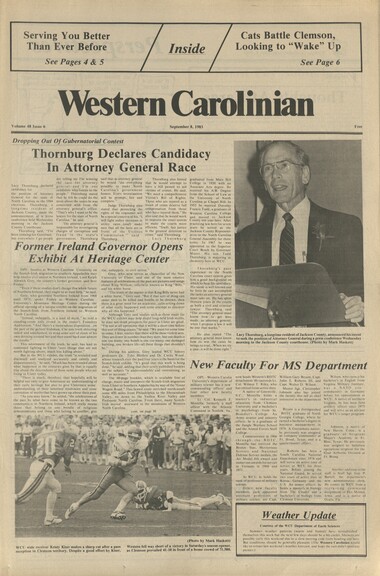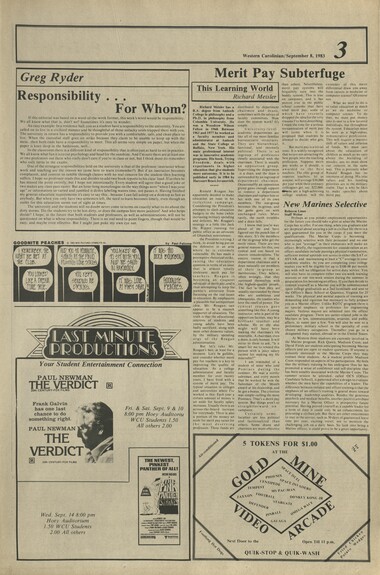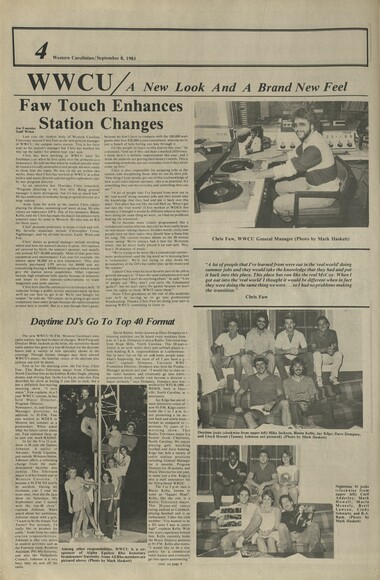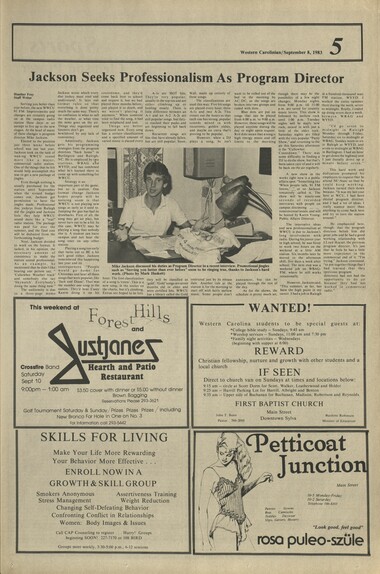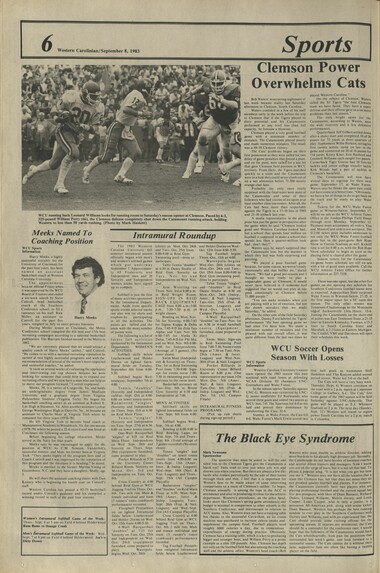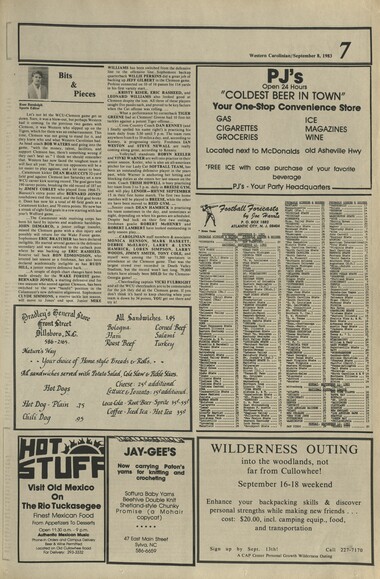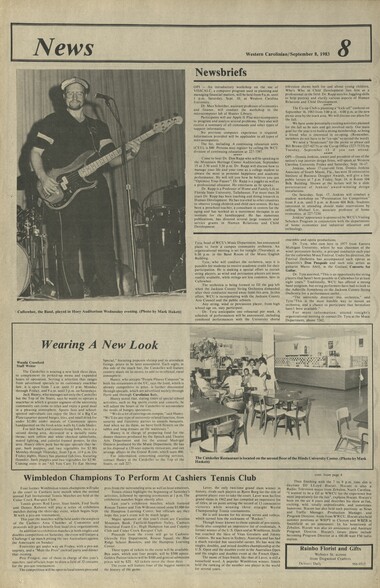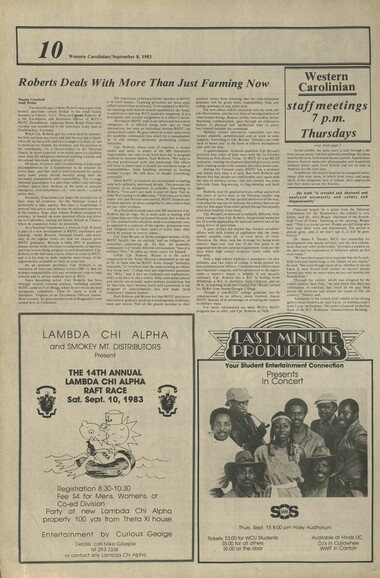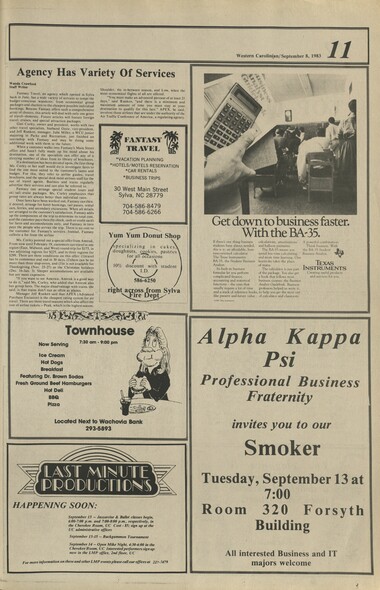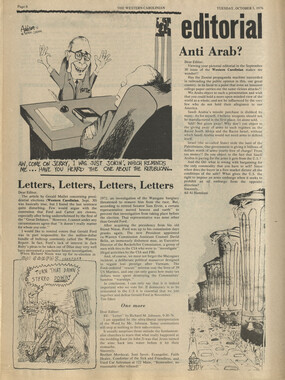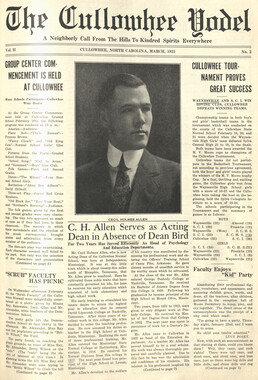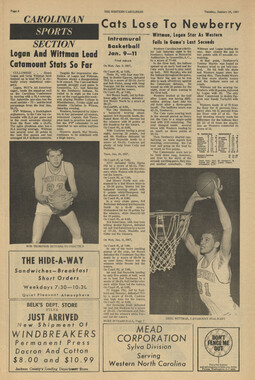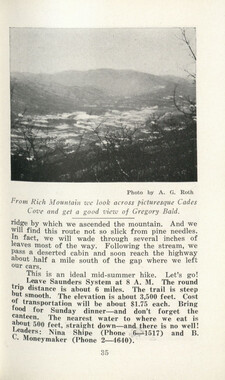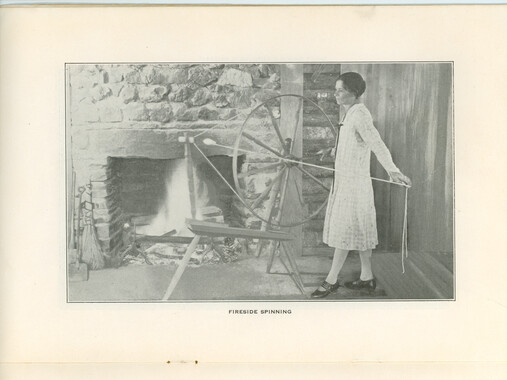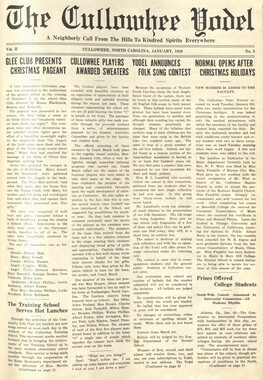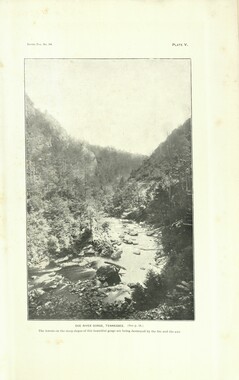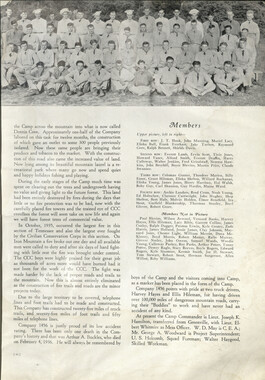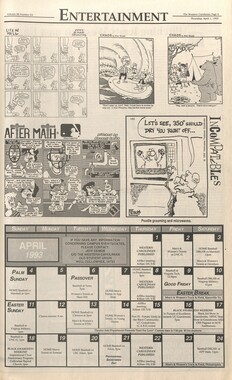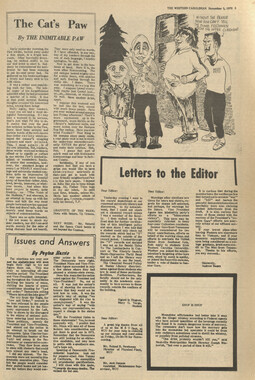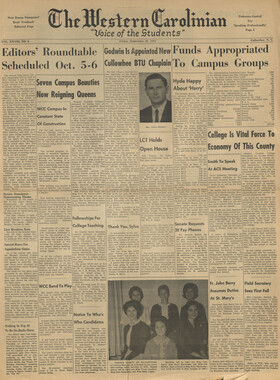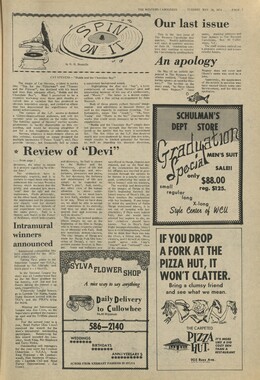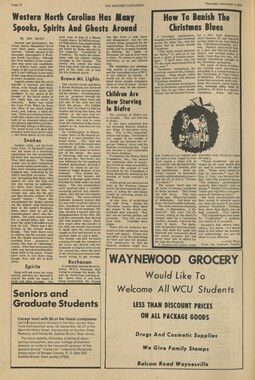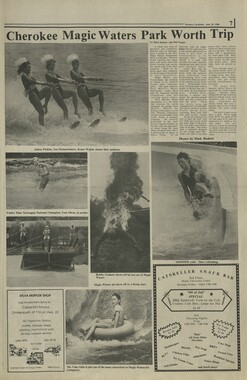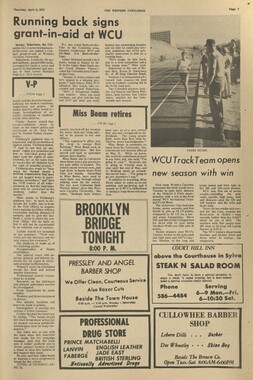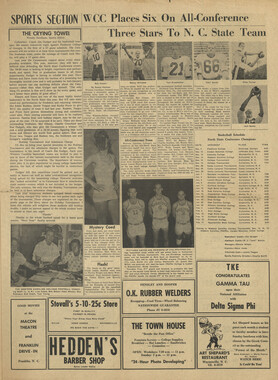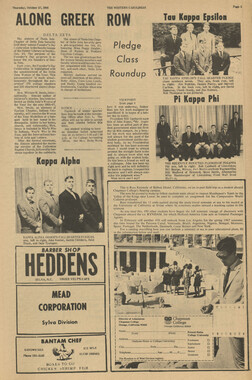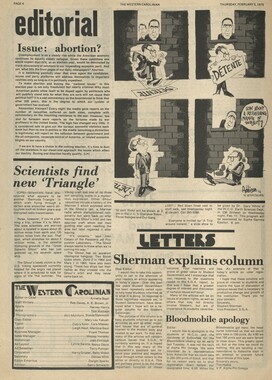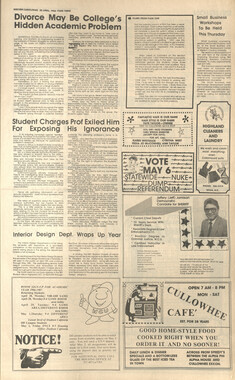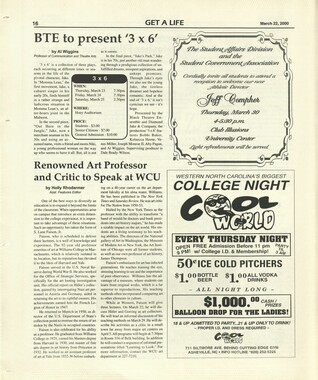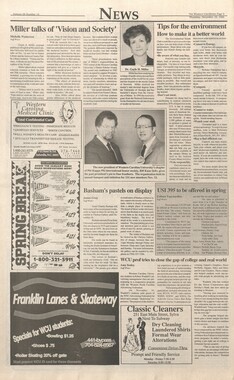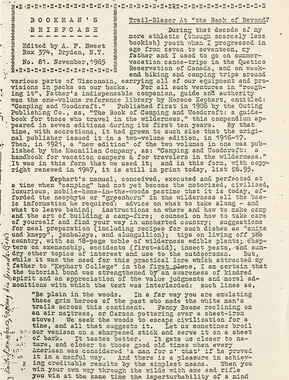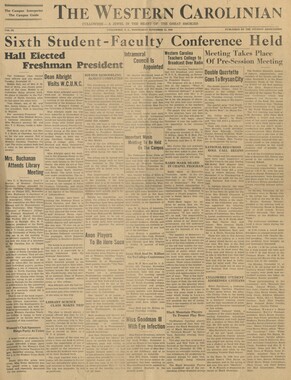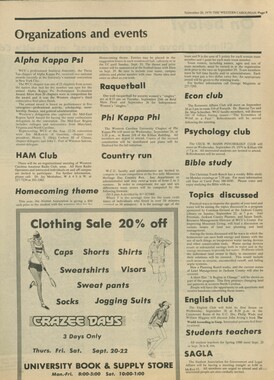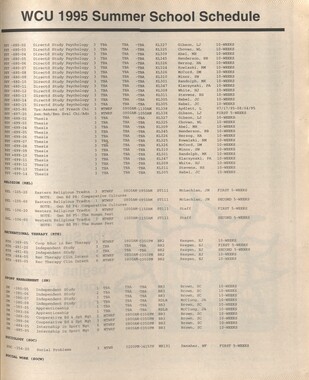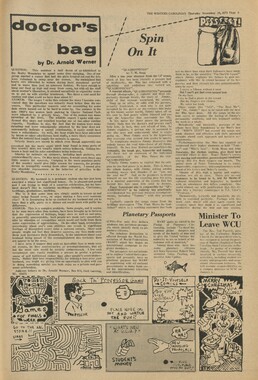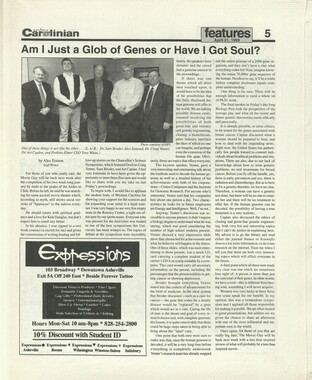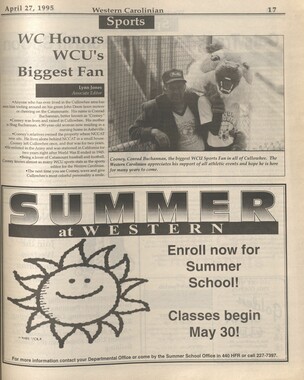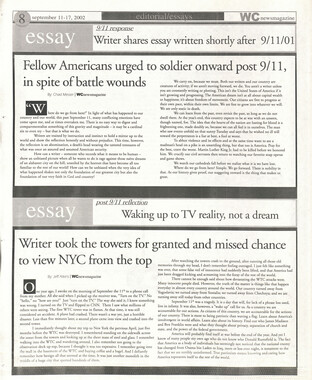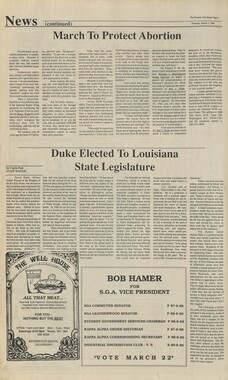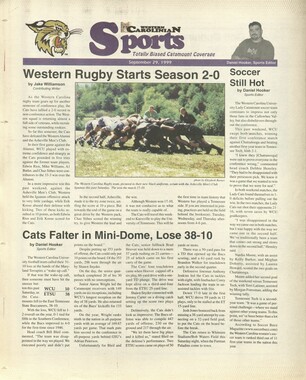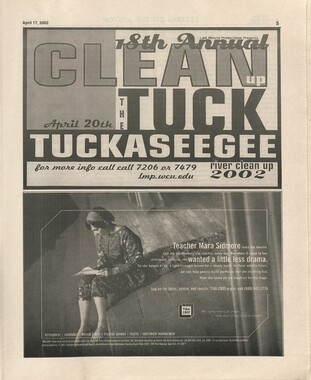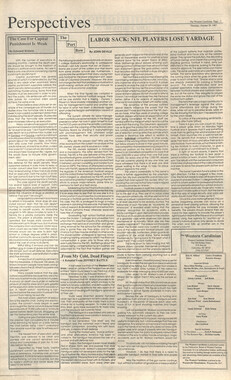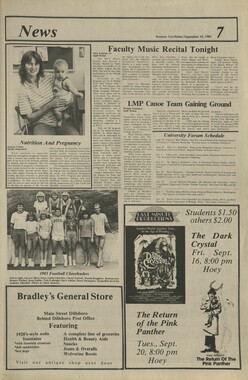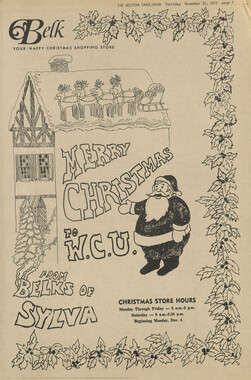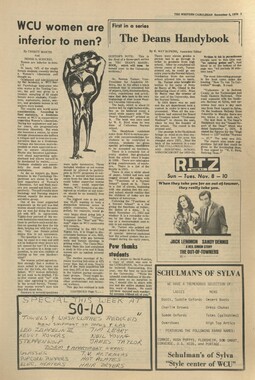Western Carolina University (20)
View all
- Canton Champion Fibre Company (2308)
- Cherokee Traditions (292)
- Civil War in Southern Appalachia (165)
- Craft Revival (1942)
- Great Smoky Mountains - A Park for America (2766)
- Highlights from Western Carolina University (430)
- Horace Kephart (941)
- Journeys Through Jackson (154)
- LGBTQIA+ Archive of Jackson County (85)
- Oral Histories of Western North Carolina (314)
- Picturing Appalachia (6772)
- Stories of Mountain Folk (413)
- Travel Western North Carolina (160)
- Western Carolina University Fine Art Museum Vitreograph Collection (129)
- Western Carolina University Herbarium (92)
- Western Carolina University: Making Memories (708)
- Western Carolina University Publications (2283)
- Western Carolina University Restricted Electronic Theses and Dissertations (146)
- Western North Carolina Regional Maps (71)
- World War II in Southern Appalachia (131)
University of North Carolina Asheville (6)
View all
- Allanstand Cottage Industries (62)
- Appalachian National Park Association (53)
- Bennett, Kelly, 1890-1974 (1388)
- Berry, Walter (76)
- Brasstown Carvers (40)
- Carver, George Washington, 1864?-1943 (26)
- Cathey, Joseph, 1803-1874 (1)
- Champion Fibre Company (233)
- Champion Paper and Fibre Company (297)
- Cherokee Indian Fair Association (16)
- Cherokee Language Program (22)
- Crowe, Amanda (40)
- Edmonston, Thomas Benton, 1842-1907 (7)
- Ensley, A. L. (Abraham Lincoln), 1865-1948 (275)
- Fromer, Irving Rhodes, 1913-1994 (70)
- George Butz (BFS 1907) (46)
- Goodrich, Frances Louisa (120)
- Grant, George Alexander, 1891-1964 (96)
- Heard, Marian Gladys (60)
- Kephart, Calvin, 1883-1969 (15)
- Kephart, Horace, 1862-1931 (313)
- Kephart, Laura, 1862-1954 (39)
- Laney, Gideon Thomas, 1889-1976 (439)
- Masa, George, 1881-1933 (61)
- McElhinney, William Julian, 1896-1953 (44)
- Niggli, Josephina, 1910-1983 (10)
- North Carolina Park Commission (105)
- Osborne, Kezia Stradley (9)
- Owens, Samuel Robert, 1918-1995 (11)
- Penland Weavers and Potters (36)
- Roberts, Vivienne (15)
- Roth, Albert, 1890-1974 (142)
- Schenck, Carl Alwin, 1868-1955 (1)
- Sherrill's Photography Studio (2565)
- Southern Highland Handicraft Guild (127)
- Southern Highlanders, Inc. (71)
- Stalcup, Jesse Bryson (46)
- Stearns, I. K. (213)
- Thompson, James Edward, 1880-1976 (226)
- United States. Indian Arts and Crafts Board (130)
- USFS (683)
- Vance, Zebulon Baird, 1830-1894 (1)
- Weaver, Zebulon, 1872-1948 (58)
- Western Carolina College (230)
- Western Carolina Teachers College (282)
- Western Carolina University (1794)
- Western Carolina University. Mountain Heritage Center (18)
- Whitman, Walt, 1819-1892 (10)
- Wilburn, Hiram Coleman, 1880-1967 (73)
- Williams, Isadora (3)
- Cain, Doreyl Ammons (0)
- Crittenden, Lorraine (0)
- Rhodes, Judy (0)
- Smith, Edward Clark (0)
- Appalachian Region, Southern (2569)
- Asheville (N.C.) (1923)
- Avery County (N.C.) (26)
- Blount County (Tenn.) (161)
- Buncombe County (N.C.) (1672)
- Cherokee County (N.C.) (283)
- Clay County (N.C.) (555)
- Graham County (N.C.) (233)
- Great Smoky Mountains National Park (N.C. and Tenn.) (519)
- Haywood County (N.C.) (3524)
- Henderson County (N.C.) (70)
- Jackson County (N.C.) (4694)
- Knox County (Tenn.) (25)
- Knoxville (Tenn.) (12)
- Lake Santeetlah (N.C.) (10)
- Macon County (N.C.) (420)
- Madison County (N.C.) (212)
- McDowell County (N.C.) (39)
- Mitchell County (N.C.) (132)
- Polk County (N.C.) (35)
- Qualla Boundary (981)
- Rutherford County (N.C.) (76)
- Swain County (N.C.) (2115)
- Transylvania County (N.C.) (270)
- Watauga County (N.C.) (12)
- Waynesville (N.C.) (84)
- Yancey County (N.C.) (72)
- Aerial Photographs (3)
- Aerial Views (60)
- Albums (books) (4)
- Articles (1)
- Artifacts (object Genre) (228)
- Bibliographies (1)
- Biography (general Genre) (2)
- Cards (information Artifacts) (38)
- Clippings (information Artifacts) (191)
- Crafts (art Genres) (622)
- Depictions (visual Works) (21)
- Design Drawings (1)
- Drawings (visual Works) (184)
- Envelopes (73)
- Facsimiles (reproductions) (1)
- Fiction (general Genre) (4)
- Financial Records (12)
- Fliers (printed Matter) (67)
- Glass Plate Negatives (381)
- Guidebooks (2)
- Internegatives (10)
- Interviews (815)
- Land Surveys (102)
- Letters (correspondence) (1013)
- Manuscripts (documents) (618)
- Maps (documents) (177)
- Memorandums (25)
- Minutes (administrative Records) (59)
- Negatives (photographs) (5835)
- Newsletters (1285)
- Newspapers (2)
- Occupation Currency (1)
- Paintings (visual Works) (1)
- Pen And Ink Drawings (1)
- Periodicals (193)
- Personal Narratives (10)
- Photographs (12976)
- Plans (maps) (1)
- Poetry (6)
- Portraits (4533)
- Postcards (329)
- Programs (documents) (151)
- Publications (documents) (2236)
- Questionnaires (65)
- Scrapbooks (282)
- Sheet Music (2)
- Slides (photographs) (402)
- Songs (musical Compositions) (2)
- Sound Recordings (796)
- Specimens (92)
- Speeches (documents) (15)
- Tintypes (photographs) (8)
- Transcripts (322)
- Video Recordings (physical Artifacts) (23)
- Vitreographs (129)
- Text Messages (0)
- A.L. Ensley Collection (275)
- Appalachian Industrial School Records (7)
- Appalachian National Park Association Records (336)
- Axley-Meroney Collection (2)
- Bayard Wootten Photograph Collection (20)
- Bethel Rural Community Organization Collection (7)
- Blumer Collection (5)
- C.W. Slagle Collection (20)
- Canton Area Historical Museum (2110)
- Carlos C. Campbell Collection (282)
- Cataloochee History Project (64)
- Cherokee Studies Collection (4)
- Daisy Dame Photograph Album (5)
- Daniel Boone VI Collection (1)
- Doris Ulmann Photograph Collection (112)
- Elizabeth H. Lasley Collection (1)
- Elizabeth Woolworth Szold Fleharty Collection (4)
- Frank Fry Collection (95)
- George Masa Collection (173)
- Gideon Laney Collection (452)
- Hazel Scarborough Collection (2)
- Hiram C. Wilburn Papers (28)
- Historic Photographs Collection (236)
- Horace Kephart Collection (861)
- Humbard Collection (33)
- Hunter and Weaver Families Collection (1)
- I. D. Blumenthal Collection (4)
- Isadora Williams Collection (4)
- Jesse Bryson Stalcup Collection (47)
- Jim Thompson Collection (224)
- John B. Battle Collection (7)
- John C. Campbell Folk School Records (80)
- John Parris Collection (6)
- Judaculla Rock project (2)
- Kelly Bennett Collection (1407)
- Love Family Papers (11)
- Major Wiley Parris Civil War Letters (3)
- Map Collection (12)
- McFee-Misemer Civil War Letters (34)
- Mountain Heritage Center Collection (4)
- Norburn - Robertson - Thomson Families Collection (44)
- Pauline Hood Collection (7)
- Pre-Guild Collection (2)
- Qualla Arts and Crafts Mutual Collection (12)
- R.A. Romanes Collection (681)
- Rosser H. Taylor Collection (1)
- Samuel Robert Owens Collection (94)
- Sara Madison Collection (144)
- Sherrill Studio Photo Collection (2558)
- Smoky Mountains Hiking Club Collection (616)
- Stories of Mountain Folk - Radio Programs (374)
- The Reporter, Western Carolina University (510)
- Venoy and Elizabeth Reed Collection (16)
- WCU Gender and Sexuality Oral History Project (32)
- WCU Mountain Heritage Center Oral Histories (25)
- WCU Oral History Collection - Mountain People, Mountain Lives (71)
- WCU Students Newspapers Collection (1744)
- Western North Carolina Tomorrow Black Oral History Project (69)
- William Williams Stringfield Collection (2)
- Zebulon Weaver Collection (109)
- African Americans (390)
- Appalachian Trail (35)
- Artisans (521)
- Cherokee art (84)
- Cherokee artists -- North Carolina (10)
- Cherokee language (21)
- Cherokee pottery (101)
- Cherokee women (208)
- Church buildings (170)
- Civilian Conservation Corps (U.S.) (110)
- College student newspapers and periodicals (1830)
- Dams (107)
- Dance (1023)
- Education (222)
- Floods (61)
- Folk music (1015)
- Forced removal, 1813-1903 (2)
- Forest conservation (220)
- Forests and forestry (1184)
- Gender nonconformity (4)
- Great Smoky Mountains National Park (N.C. and Tenn.) (181)
- Hunting (38)
- Landscape photography (25)
- Logging (118)
- Maps (83)
- Mines and mineral resources (8)
- North Carolina -- Maps (18)
- Paper industry (38)
- Postcards (255)
- Pottery (135)
- Railroad trains (71)
- Rural electrification -- North Carolina, Western (3)
- School integration -- Southern States (2)
- Segregation -- North Carolina, Western (5)
- Slavery (5)
- Sports (452)
- Storytelling (244)
- Waterfalls -- Great Smoky Mountains (N.C. and Tenn.) (66)
- Weaving -- Appalachian Region, Southern (280)
- Wood-carving -- Appalachian Region, Southern (328)
- World War, 1939-1945 (173)
Western Carolinian Volume 48 Number 06
Item
Item’s are ‘child’ level descriptions to ‘parent’ objects, (e.g. one page of a whole book).
-
-
t/iewpoint Monica Henson Thoughts At Large Question number one? Does any government of a civilized modern nation have the right to comdemn 250 innocent people to fiery death on the charge that their aircraft looked like a spy plane. Question number two? Why did this government wait almost a week before even acknowledging that a plane was in fact shot down? Question number three? What are you going to do about our government's reaction come next November? I for one am going to take a long hard look at the candidates for the presidency in 1984; world crises such as the Korean jetliner cannot and should not be met with a slap on the wrist and empty words. I was one of the few, the proud, the purple in a sea of orange last Saturday, cheering on the Catamounts against the mighty Clemson Tigers. The Cats were soundly defeated and I got a cold from the rain, but I came awav from Clemson with a few insights that don't have much to do with football. First. I'm proud to be a Catbacker no matter what the score is. I'm glad that this university places an emphasis on academics, art, architecture, and many other aspects, as well as athletics. Sure, Clemson has a great athletic program; but so does WCU, when compared to other schools our own size or smaller. Let's keep a perspective on the situation. IPTAY raises well over $3 million a year to buy and maintain a stable ol superathletes; 1 certainly want WCU to win ball games, but not if it gets us recognition only for corrupt recruiting practices, defeating the purpose. 1 saw literally hundreds of familiar faces today around campus and going to class. At WCU football games 1 see even more. I wonder how many of those Clemson students could say they knew even 10% of the other students in Death Valley Saturday, much less the members of their booster club. Many WCU students know the football players and other varsity athletes personally, not as some sort of select group of privately subsidized sports specimens to be envied and gawked at. Ed West is known to many students as an RA as well as a football player. Former Lady Cat basketball player Kimberly Logan worked as an ad designer here at the Carolinian. Haywood Smith brought some of his friends from Madison over to my offices last week to see just what it is I do on Wednesday nights with Tony Cole; they even picked up some action photos in the deal. The point I want to make is this: we may not have an athletic program here to compare with that ofa school with a 15,000 or more enrollment; but if we stop and look at what we do have, I think that the many benefits outweigh the few disadvantages when speaking ofthe student body in general. Just kick the Boone Goon's butts come November, and perform well against the teams that count, guys. Let Clemson "go to the Dawgs" and Go Cats! I want to take a moment to thank all the students and WCU personnel who have helped me off to a great start this summer as well as fall semester. Without the help and encouragement of friends and supporters it would be very difficult to publish a quality newspaper and keep the boat sailing smoothly. I will continue to dedicate this newspaper to the service of the students and the university community, and I would appreciate any suggestions and criticisms my readers have to offer. New Jersey Sows New Crop Of Teachers Field Newspaper Syndicate G Maxwell len OCody Shearer One of the more unfortunate corollaries to the nation's educational crisis is a looming demand for new teachers. Even as educators try to sort out local strengths and weaknesses, rising school enrollments are likely to require more than 250,000 new teachers by 1990— twice the number of college graduates now expected to enter the field. As a result, quality could continue to decline. Yet, as school districts open their doors this week after several months of fault-finding, officials in New Jersey are planning to turn a bleak situation to their advantage. On Wednesday (Sept. /), the State Board of Education in Trenton will learn the details ofa plan that would allow liberal arts graduates to enter the teaching profession without formal training. While approval may be months away, proponents believe that the back-door approach could improve teacher quality and boost the profession's appeal among recent college graduates. In New Jersey, as in other states, various factors have contributed to doubts about educational quality and made solutions elusive. On one hand, while state population and the number of teachers have increased, school superintendents have seen school enrollments drop by a fifth since 1972. Meanwhile, during the same period. New Jersey teachers have experienced a 20 percent loss in purchasing power, as local wage increases fell short of already meager national averages. As everywhere, low salaries have often made teaching a career-of-last-resort • Worse yet. according to a recent report by the Carnegie Foundation forthe Advancement of Teaching, intended education majors in New Jersey scored below both state and national averages on the SAT in 1982. (Education majors nationwide, similarly, earned combined scores which were, on average, 80 points below that of all college-bound seniors.) Historically, of course, the education major has ranked among the least rigorous of college disciplines. C. Emily Feistritzer, the teacher educator who wrote the 120-page report, laid much of the blame for educational decline on education pedagogy. She told our reporter Michael Duffy that education majors spend too much time on methods and too little on their subject areas. Bob Hochstein ofthe Carnegie Foundation put it this way: "You don't become a good teacher by taking lots of education courses. You become a good teacher by being a good economist or a good historian." Feistritzer and Hochstein reflect a growing consensus that the education major may be the biggest villain in the education crisis. Indeed, the pending New Jersey plan is an attempt to stage an end run around the education degree. As proposed, liberal arts graduates would become eligible for a teaching license after completing a year's supervised teaching internship and passing a qualifying exam. Interested history, biology or French graduates could simply contact a local school district and apply for work like any other job-seeker. Said a spokesman for the New Jersey Department of Education: "lt would open up new avenues for people who would like to teach but didn't go through teacher education." Teachers' unions, not surprisingly, predict that "probationary teachers" will depress salaries and dampen confidence in schools. In the case of the New Jersey proposal, at least one criticism seems in order: Trainees won't need to take a single education course for certification; similar programs in other states, such as Virginia, wisely require minimal coursework in developmental psychology or a trainee's subject area. If, as the Bureau of Labor Statistics estimates, the U.S. will need twice as many teachers as computer programmers by 1990, proposals such as New Jersey's would seem to hold promise. Their architects may have hit on a way to raise the intellectual caliber of the teaching ranks while luring candidates for the future. Yet it remains to be seen whether state and local school districts can muster the essential lubricant for attracting better teachers: higher salaries. Western Carolinian Editor-in-Chief Monica Henson Business Manager Kenn Port Design Editor Tony Cole Photography Editor Mark Haskett Sports Editor Russ Randolph News/Feature Editor Greg Ryder Layout Dan Mangold Ad Design Debbie McElroy Production Lynn Hamrick. Tammy Greene. Monica Henson" Ad Sales Mark Clark, Robert Hosack Circulation Manager l.arry Woods Sportswriters Mark Newsome, Doug Irwin Entertainment RA. Bush, Brett lawson Staff Writers Wanda Crawford. Rebecca Lines, Alex Lesueur, Lawrence Hamrick, Jr.. Steve Crawford, James Utt \ Heather Frcy. Cathy Stewart. Joe Fournicr fit V/AS AU, A I 3AD N\i5TAkfc Vl& •TOOlAQHrT \d£ VJiRE. tfm INVADED ty MtAM peoPie... \ VK. COULD Wt 5WW IT 1 vi«b a u.5. s?y fun*- OUfc PHOTS VlARNtD THS V\Ml SiMiRAl TlM£5 AND FfoiD StVtRAL SAF6 YlARNvflfc SHOTS TO ALVOW TH& 747 pllOT TO Wtffl HMS&F... Vfc Afct TRULY SOKR/AND . rfcARTCKPtetf OfcR TrliS "WSJl AND UNr^UM^TWG^.. LIT SHAU H6V6R HAPP£M AGAlNl <G** VifcSTSMi Class A ttendance: A Reflection Of Class Quality Guest Opinion: Mark Melrose Every semester the first day of classes always holds some special surprise for everyone. Maybe your long lost high school sweetheart is sitting in the seat next to you, but unfortunately has managed to gain at least forty pound* Or perhaps the very professor for whom you waited in registration lines for two hours has been quietly replaced by another who is the subject of your roommate's worst nightmares. Whatever the case, something which annoys me worse than any Friday afternoon exam are various attendance policies. Attendance policies usually appear somewhere on the course syllabus, but it is my contention that they need not appear at all. Professors who do institute an attendance policy must, of course, supply an equally frightening penalty to those unfortunate students who may miss just one time too many. In some respects the Chinese Water Drip Torture might prove to be more pleasant and appropriate. Penalties might include writing lengthy, meaningless papers, preparing additional class assignments, or losing well-earned points from one's final average. All these and other similar punishments strike me as being wholly inappropriate. The penalty students should receive for not attending class should be their own failure to learn the information. It should not be the job ofthe professors to plan a wide variety of attendance policies. One of my problems with understanding these policies may be that I am aware of a difference between high school and college. While in high school, students are required by law to spend their days toiling away in the classroom. At this university, however, students pay anywhere from $410.00 to over $1500.00 each semester for their education. Yet some professors still feel obligated to insure that these same students sit through each of their classes. But as adults, I feel that college students should be capable of deciding whether or not to attend a particular lecture. It is both their money and education which is being lost if they feel that "General Hospital" is more beneficial that Biology 101. Therefore, a professor might ask what will keep each of his classes from becoming a roomful of empty seats. The answer is obvious. The quality of both the instructor and the material will keep students wanting to come to class. Is is possible that some instructors make up for their lack of stimulating classroom material with an attendance policy? Perhaps they rightfully believe that their courses are so uneventful that they must make students attend them. The days of bringing a note in from Mother for merely missing a class should be long since buried in one's adolescent past. The results of the absence will soon become evident on future tests and quizes. Another situation negating the use of attendance policies are the professors whose source for 99.9% of the lecture material originate from the textbook. I do admit that there is very little which can be done about this depressing kind of teaching. But when an instructor requires my presence for a recitation of the chapter I read the evening before, under penalty of losing grade points, I become outraged. If no original material is to be presented, why penalize the students who are intelligent enough to realize that and budget their time in a more constructive area. If a student does not attend class and receives a poor test score, so be it. However, if some students are intelligent enough to read a text on their own and score well on the tests, they should not be penalized for failing to hear repetitive lectures. I do realize that some professors will object to my position, and I will concede on a couple of points. Some courses such as mathematics, which because of their very nature must rely heavily upon a text, should not be lumped into the same general category as those which just lack innovation. Also in those few courses where grades are determined by each student's daily classroom participation, there should be penalties for missing. This is a stark contrast, however, to the normal extensive lecture class. As a result, most classes at this university do fall under the scope of my criticism. Professors should strive to make each class interesting so that students will be motivated to attend. I believe a drop in attendance strongly reflects upon the quality of the class. The answer does not lie in a rigid and powerful attendance policy, but instead in improving the class material and presentation. Let us give the students at WCU a little bit of credit. Letters Dear Editor, 1 wish to inform everyone participating in the upcoming Lambda Chi Raft Race about last years aftermath. You will remember that the Western Carolinian featured a front page article after the race with a photograph of a raft and crew. You will also remember a beer can floating in the water next to that raft and crew. That was no coincidence! After that race you could find beer cans, beer cartons, deflated and inflated inner tubes, rafts, pieces of rafts, anything you can carry down the Tuckaseigee on a raft you could of found on that stretch of the river raced. I'm all for everyone having a terrifice time on the Tuckaseigee or any river but 1 really don't believe that anyone in Cullowhee enjoys looking at the trash left on the river. Especially the people of Sylva, who I'm sure dread the time when some of the trash gets washed down to them to clean up. I feel it is everyone's responsibility to take off what they take on the river and I'm not talking about clothes. That also includes spectators. A also feel it is Lambda Chi's responsibility to see that everyone does keep the river clean and it they don't then Lambda Chi should do it themselves or one day soon they won't be allowed to have their Annual Tuckaseigee Raft Race. Thank you, Jill E. Tooley
Object
Object’s are ‘parent’ level descriptions to ‘children’ items, (e.g. a book with pages).
-
The Western Carolinian is Western Carolina University's student-run newspaper. The paper was published as the Cullowhee Yodel from 1924 to 1931 before changing its name to The Western Carolinian in 1933.
-
